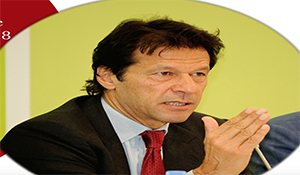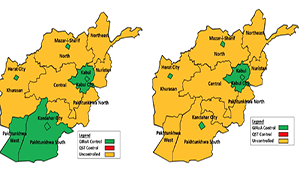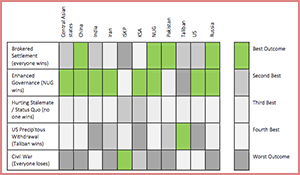
Outer Space in the Media Space: How Russian and Chinese News Media Present the Commercialization and Militarization of the Space Domain
Authors: Dr. Skye Cooley (Oklahoma State University); Randy Kluver (Oklahoma State University); Dr. Ethan Stokes (University of Alabama) Report Preview This report details Russian and Chinese media presentations of operations and intentions in the space domain to their respective populations. These presentations provide us insight into how members of these nation states understand their government’s […]
Continue Reading
Iran’s Relationship to Yemeni Zayidis
Iran’s Relationship to Yemeni Zayidis Authors | Editors: Vern Liebl (Marine Corps Center for Advanced Operational Culture Learning). Executive Summary Question 10: Do views of the Velayat-i-Faqih (in Yemen) present challenges to Iranian influences among holders of Zayid views? Question 11: Do divergent religious views/practices present challenges among the Iranian populace in relation to presentation […]
Continue ReadingMedia Narrative Analysis: Iranian, Russian, and Chinese News Coverage of the Future of Afghanistan
Media Narrative Analysis: Iranian, Russian, and Chinese News Coverage of the Future of Afghanistan Contributors: Cooley, S.C. (Oklahoma State University) & Hinck, R. S. (Monmouth College) Executive Summary This project analyzed Chinese, Russian, and Iranian media narratives concerning interests in, and future prospects of, Afghanistan stability through three phases: Phase I (May-June, 2018; 79 articles), […]
Continue ReadingReconciliation and Reintegration in Afghanistan
Reconciliation and Reintegration in Afghanistan Contributors: Kuznar, L., Stevenson, J., Polansky (Pagano), S., Jafri, A., & Kuznar, E. (NSI, Inc.) Executive Summary This report provides an analysis of the compatibility of reconciliation and reintegration processes, an assessment of the potential for achieving successful reconciliation and reintegration in Afghanistan, and an examination of which US government […]
Continue Reading
An Analysis of Prime Minister Imran Khan’s Discourse From 2008 – 2018
An Analysis of Prime Minister Imran Khan’s Discourse From 2008 – 2018 Contributors: Aviles, W. & Kuznar, L. (NSI, Inc.) Executive Summary This study was conducted to address the question: How can the US increase the resolve and capability of Pakistan to support political reconciliation in Afghanistan and the region? Two methods of textual analysis […]
Continue Reading
Post-Negotiated Settlement Afghan Stability Dynamics
Post-Negotiated Settlement Afghan Stability Dynamics Contributors: TRADOC G27 Models and Simulations Branch Executive Summary This paper provides the TRADOC G27 Models and Simulations Branch initial assessment for Phases I and II of the Strategic Multilayer Assessment (SMA) CENTCOM Afghanistan project. Phase I specifically assessed the impact of three different hypothetical Afghan government constructs: Centralized, Enhanced […]
Continue Reading
The Options for Getting to Political Reconciliation in Afghanistan
The Options for Getting to Political Reconciliation in Afghanistan Contributors: Jafri, A., Stevenson, J., Kuznar, E. & Canna, S. (NSI, Inc.) Executive Summary In August of 2018, United States Central Command asked the Strategic Multilayer Assessment Reachback team, How can the United States best increase the resolve and capability of regional actors to get to […]
Continue ReadingContagious Counterinsurgency: How Civilian Social Networks Shape Military Control
“Contagious Counterinsurgency: How Civilian Social Networks Shape Military Control” Speaker: Haim, D. (Dartmouth College) Date: 18 December 2018 Speaker Session Preview SMA hosted a speaker session presented by Dr. Dotan Haim (Dartmouth College) as a part of its SMA STRATCOM Speaker Series. During his presentation, Dr. Haim argued that the strength of civilian social networks, […]
Continue Reading
Grand Strategy
“Grand Strategy” Speaker: Layton, P. (New America) Date: 13 December 2018 Speaker Session Preview SMA hosted an exclusive Q&A session featuring Dr. Peter Layton (Griffith Asia Institute, Griffith University) as a part of its Future of Global Power Competition & Conflict Speaker Series. Dr. Layton highlighted the two primary premises upon which his book, entitled […]
Continue ReadingIs Fait Accompli the Primary Challenge for Deterrence in the 21st Century?
“Is Fait Accompli the Primary Challenge for Deterrence in the 21st Century?” Speaker: Altman, D. (Georgia State University) Date: 12 December 2018 Speaker Session Preview SMA hosted a speaker session presented by Dr. Daniel Altman (Georgia State University) as a part of its SMA STRATCOM Academic Alliance Speaker Series. During this presentation, Dr. Altman argued […]
Continue Reading